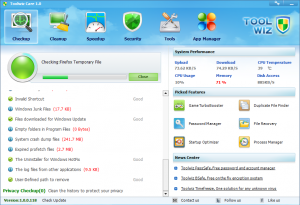 Does the world really need another PC maintenance suite? Probably not, but they keep coming anyway. And at first glance, the latest, Toolwiz Care, didn’t look like it would exactly break new ground. The program includes a Registry cleaner, for instance. A module to free up a little hard drive space (though not as much as if we’d just installed CCleaner). And another to help control our Windows startup programs: it all seemed very ordinary.
Does the world really need another PC maintenance suite? Probably not, but they keep coming anyway. And at first glance, the latest, Toolwiz Care, didn’t look like it would exactly break new ground. The program includes a Registry cleaner, for instance. A module to free up a little hard drive space (though not as much as if we’d just installed CCleaner). And another to help control our Windows startup programs: it all seemed very ordinary.
When we took a closer look, though, some interesting differences emerged. So the Startup Programs module didn’t simply provide a list of applications and leave us to make the difficult decisions. It actually makes sensible recommendations about what you should disable or remove to accelerate your boot time. And provides figures to help put your boot time in context in the first place: our boot time is apparently 30-percent faster than the average of other Toolwiz Care users, which tells us it’s probably not worth expending a great deal of effort in trying to improve it further.
Similarly, the Disk Clean option initially looks poor, far below the standards of CCleaner. But by clicking on Settings, say, we can have Toolwiz Care locate redundant files by our choice of extension (*.old, *.tmp etc). The Disk Analyze feature can reveal which files and folders are using the most drive space, helping you to zoom in on the cause of the problem. And a Duplicate File Finder will also quickly identify files which may be wasting drive space.
But the real surprises appear when you select the Tools menu.
Super Explorer and Super Registry tools allow you to browse your file system and Registry without using the Windows API, for instance – perfect for bypassing rootkits or other stealthy malware, and discovering their otherwise hidden traces.
There’s also an MBR Backup and Restore tool, which even allows you to manually edit the MBR if you know what you’re doing.
And you get small tools to undelete files, generate secure passwords, encrypt confidential documents, control Internet Explorer addons, edit Windows context menus and a whole lot more.
Yet despite all this functionality, the suite remains relatively lightweight, consuming barely more than 11MB of hard drive space, and around 22MB of RAM when first launched and running in the background.
The primary Toolwiz Care options aren’t anything special, then: the Disk Cleaner isn’t a patch on the leading freeware, and Registry cleaners don’t do much anyway. Look a little further, though, and you’ll find the suite has more than enough interesting tools to deserve its place on your hard drive, and we’d recommend you give it a look.

